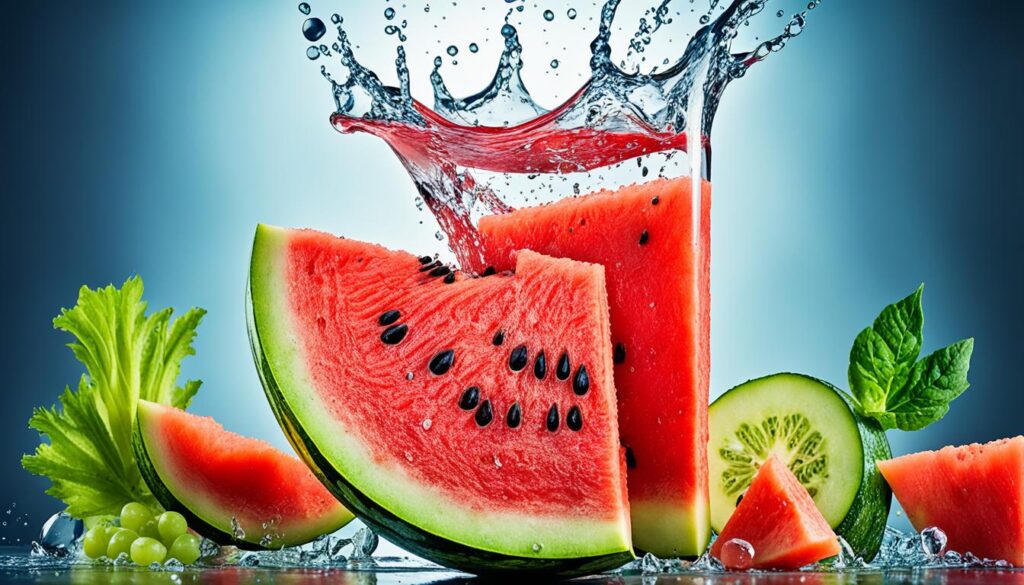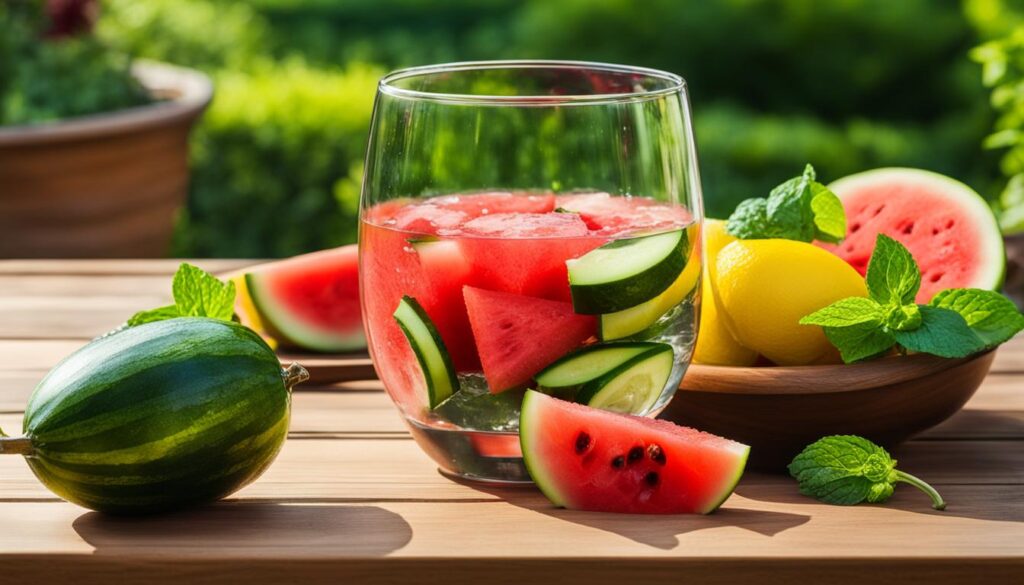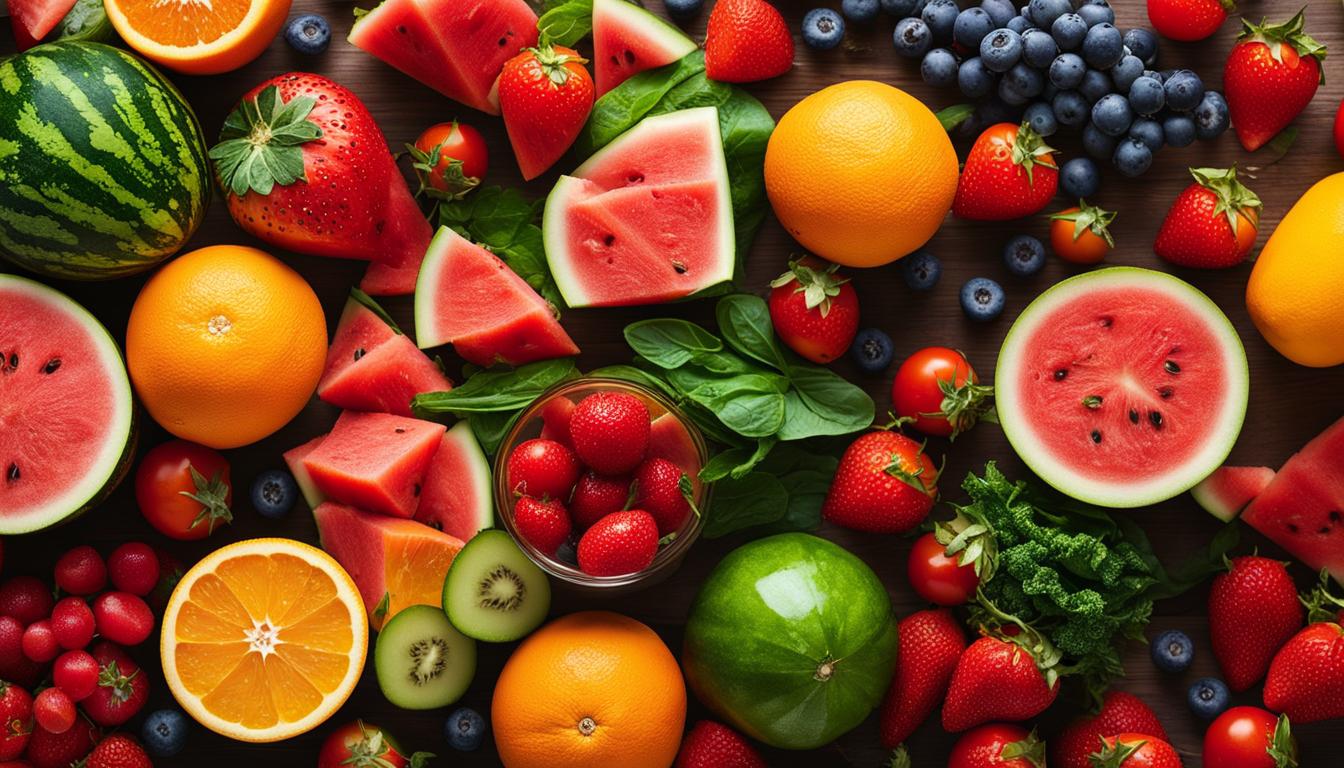Unlock the secret to vibrant health with the top hydrating foods that do more than just quench your thirst. When it comes to diet hydration, it’s not just about the water you drink; it’s also about incorporating hydrating foods that add a splash of nourishment to every bite. These best foods for hydration are essential to include in your diet, blending taste and health seamlessly. Embrace the discovery of the best ways to keep hydrated and energized by inviting these top 10 hydrating foods to your regular dietary lineup, and experience a boost to your overall well-being.
Whether you’re an athlete, a busy professional, or simply health-conscious, learning how to incorporate hydrating foods into your meals can make a significant difference. With our guide, you’ll uncover appetizing choices that not only satisfy your taste buds but also provide substantial hydration to keep your body’s needs met. Give your diet a delectable and hydrating transformation today.
Key Takeaways
- Discover the best foods for hydration that can enhance your daily water intake beyond beverages.
- Identify the top hydrating foods that are both nutrient-rich and low in calories, aiding in weight management.
- Explore innovative ways to incorporate hydrating foods into your diet, keeping meals exciting and diverse.
- Understand how diet hydration contributes to overall health with foods that offer vitamins, minerals, and antioxidants.
- Learn the importance of adding a variety of hydrating foods to your diet for long-term health benefits and sustained hydration.
The Importance of Hydration and Food’s Role
The connection between staying hydrated and maintaining good health is undeniable. While water is the most straightforward approach to hydration, our diets also play an integral part. There exists an abundance of hydrating foods that not only replenish fluids but supply crucial nutrients as well. Understanding the severity of dehydration, and recognizing the role that certain foods play beyond liquids, is vital in fostering a balanced, hydrated state of well-being.
Understanding Dehydration and Its Impact
Ignoring our body’s hydration needs can lead to serious health repercussions, such as debilitating fatigue, persistent headaches, skin issues, muscle cramps, dangerously low blood pressure, and a swift heart rate. These symptoms are precursors to the dire possible outcomes of prolonged dehydration—organ failure being among the worst. It’s clear that adequate hydration is not optional—it’s imperative for our survival.
Essential Hydration Beyond Water Intake
While reaching for a glass of water may be instinctual, nourishing our bodies with hydrating foods is an alternative path to meet our fluid needs. A diet enriched with hydrating foods plays a multifaceted role in sustaining our health. Foods like watermelon, strawberries, and cucumber are not just refreshing; they’re teeming with high water content that can help maintain the balance of hydration in our bodies.
The Balance of Liquids and Solids for Hydration
More than just allies in thirst-quenching, foods for hydration carry an array of benefits that enhance overall health. Take skim milk: post-exercise, it serves as a rehydrating agent, surpassing even traditional sports drinks in its efficacy, attributing to its blend of electrolytes and protein. As such, it is vital to integrate a diverse range of hydrating foods into our diets, ensuring we stay hydrated and nourished throughout the day.
- Foods to stay hydrated are crucial for avoiding the negative effects of dehydration.
- A diet with hydrating foods can supplement daily water intake and provide essential nutrients.
- Incorporating a hydrating foods list into meal planning can ensure consistent hydration.
Hydration Powerhouses: Fruits and Vegetables
Amid the array of dietary choices, certain hydrating foods stand out for their impressive ability to not only quench thirst but also offer nutritional richness. The top 10 hydrating foods to include in your diet weave a tapestry of vitamins, minerals, and most importantly, high water content, making them critical components of diet hydration.
Fruits like watermelon, which boasts a staggering 92% water content, are not mere drops in the bucket but oceans of hydration. Strawberries follow closely, offering 91% water content and a bounty of nutrients. Cantaloupe, peaches, and oranges also secure their place as front-runners in the race to hydrate. Aligning with these fruits, hydrating vegetables such as cucumber and lettuce deliver hydration alongside crunch and flavor, while zucchini and celery round out the hydrating roster with their own juicy profiles.
| Fruit/Vegetable | Water Content | Fiber Contents | Vital Nutrients |
|---|---|---|---|
| Watermelon | 92% | 0.6g per cup | Vitamin A, Vitamin C, Magnesium |
| Strawberries | 91% | 3g per cup | Vitamin C, Folate, Manganese |
| Cantaloupe | 90% | 1g per cup | Vitamin A, Vitamin C, Fiber |
| Peaches | 89% | 2g per medium peach | Vitamin A, Vitamin C, Potassium |
| Oranges | 88% | 4.3g per orange | Vitamin C, Potassium |
| Cucumbers | 95% | 0.5g per half cup | Vitamin K, Potassium, Magnesium |
| Lettuce | 96% | 1g per cup | Vitamin K, Folate |
| Zucchini | 94% | 1g per cup | Vitamin A, Manganese, Vitamin C |
| Celery | 95% | 1.6g per cup | Vitamin K, Folate, Potassium |
Including these hydrating foods as staples in your meals not only serves your taste buds but also furnishes your body with essential hydration. It’s a savory symphony of health benefits that deserves a standing ovation and a permanent place in the wellness repertoire of anyone aiming for a balanced diet.
- Create savory salads with a base of lettuce, watermelon chunks, and citrus segments for a refreshing lunch option.
- Blend a mix of strawberries and peaches for a hydrating morning smoothie to kickstart your day.
- Enjoy chilled zucchini noodles topped with juicy tomatoes and cucumbers for a hydrating dinner dish.
- Snack on slices of crisp celery and cantaloupe for an afternoon pick-me-up that hydrates as it satisfies hunger.
In light of these facts, it’s evident that integrating fruits and vegetables high in water content into one’s diet is pivotal to achieving optimal hydration levels and underlining the importance of nurturing our bodies with the right foods for hydration.

Nutritional Bonuses in Hydrating Foods
Embarking on a journey to incorporate the Top 10 Hydrating Foods to Include in Your Diet offers diverse health advantages beyond mere hydration. These best foods for hydration seamlessly infuse essential vitamins and minerals into your body while keeping calorie counts low for a healthier lifestyle.
Vitamins and Minerals in Harmony With Hydration
The hydration embedded within foods such as watermelon and strawberries carries with it a symphony of nutrients that echo through our body’s corridors, imparting undeniable health benefits. Vitamin C, a champion of immune health, acts in concert with magnesium—a mineral involved in more than 300 biochemical reactions in the body. Potassium joins the ensemble, helping to maintain cellular fluid balance and supporting heart function. Not to be overlooked are the antioxidants present in these hydrating foods, warriors against inflammation and potential chronic illness. This harmonic convergence of components turns each bite into a nutrient-dense experience that sings to your wellness.
Let’s visualize the nutritional profile of these hydration heroes:
| Hydrating Food | Vitamin C | Potassium | Antioxidants |
|---|---|---|---|
| Watermelon | High | Medium | Lycopene |
| Strawberries | Very High | Medium | Anthocyanins, Quercetin |
| Cucumber | Modest | Modest | Flavonoids |
| Oranges | Very High | High | Hesperidin |
Low-Calorie Hydration for Weight Management
In the world of dieting and weight management, low-calorie hydrating foods become treasured assets. A glass of water can squelch thirst, but a serving of cucumber or lettuce comes with a satisfying crunch and minimal caloric impact. These foods, which are among the best foods for hydration, can help you feel full due to their high fiber content—another integral player in the weight management orchestra. With high water content and low-calorie profiles, these hydrating foods help to sustain satiety, curb appetite, and ultimately assist in controlling weight, without compromising on the body’s nutritional demands.
Considering the benefits, it’s clear that integrating these hydration-rich fruits and vegetables isn’t just a beneficial choice—it’s a deliciously smart one. The result? A hydrated, nutrient-satisfied, and happy body.
Top 10 Hydrating Foods to Include in Your Diet
From the luscious burst of a watermelon to the satisfying crunch of a cucumber, hydrating foods are pivotal for maintaining a balanced level of hydration. Foods for hydration often come packed with added nutritional benefits, making them an essential part of a healthy diet. Focusing on these foods to stay hydrated is not only a delicious way to meet your daily water needs but also an effective strategy to boost your overall health.
Embarking on a culinary journey to embrace the top 10 hydrating foods in your diet not only enhances fluid intake but also enriches your body with vitamins, minerals, and antioxidants.
| Fruits and Vegetables | Hydration Benefits | Additional Nutrients |
|---|---|---|
| Watermelon | 92% water content | Vitamin C, Vitamin A, Magnesium |
| Strawberries | 91% water content | Fiber, Vitamin C, Antioxidants |
| Cantaloupe | 90% water content | Vitamin A, Vitamin C |
| Peaches | 89% water content | Vitamin A, Vitamin C, Potassium |
| Oranges | 88% water content | Vitamin C, Potassium |
| Skim Milk | Rich in electrolytes | Protein, Calcium, Vitamin B12 |
| Cucumbers | 95% water content | Vitamin K, Potassium |
| Lettuce | 96% water content | Vitamin A, Folate |
| Broths and Soups | High water base | Varies with ingredients |
| Zucchini | 94% water content | Vitamin C, Potassium, Magnesium |
Including a variety of the best foods for hydration in your daily intake is a surefire recipe for health and wellbeing. Uniting the savory with the beneficial, these top hydrating foods offer delightful ways to refresh and rejuvenate your body, inside and out.

- Watermelon: Dive into a slice of watermelon for instant hydration support and a nourishing dose of antioxidants.
- Strawberries: Munch on these ruby red jewels to boost your water consumption and pack a punch of vitamin C.
- Cantaloupe: Indulge in cantaloupe chunks for a sweet touch to your hydration routine, brimming with vitamins A and C.
- Peaches: Enjoy juicy peaches as a hydrating dessert option that also supplies your daily vitamin needs.
- Oranges: Squeeze in a refreshing orange for both hydration and a citrusy boost of essential vitamins.
- Skim Milk: Post-workout or as a meal complement, incorporate skim milk to replenish fluids and electrolytes.
- Cucumbers: Snack on cucumber slices, a low-calorie option aiding in fluid intake and nutrient delivery.
- Lettuce: Craft a crisp lettuce-based salad to stay hydrated while enjoying an array of other health benefits.
- Broths and Soups: Savor the warmth and richness of broths and soups, perfect for hydrating during cooler seasons.
- Zucchini: Opt for zucchini in your dishes for a moisture-rich, versatile vegetable that complements any meal.
The quest for staying adequately hydrated extends beyond the water bottle. By featuring these top 10 hydrating foods in your diet, you not only contribute significantly to your fluid intake but also enhance your health with their inherent nutritional bounty.
Innovative Ways to Incorporate Hydrating Foods into Meals
A diet with hydrating foods can do wonders for your health, but figuring out how to seamlessly weave these items into your daily meals can be a culinary adventure. It’s not just about eating fruits and vegetables; it’s about being creative in how they are prepared and served to maximize both taste and hydration. The following content unveils fun and refreshing ways to keep your menu interesting and full of moisture-rich foods.
Refreshing Recipes for Every Season
No matter the time of year, there’s always an innovative way to include water-abundant fruits and vegetables into your diet. Seasons change, and with them, the opportunity to explore versatile uses of hydrating foods evolves. Summer screams for watermelon agua fresca or chilled cantaloupe cubes, while winter welcomes warm broth-based soups teeming with vegetables. Finding ways to incorporate hydrating foods caters not only to the body’s needs but also to the palate’s desire for seasonal flavor.
From Simple Snacks to Elaborate Entrees
Hydration can be deliciously discrete when integrated into every part of a meal. A diet with hydrating foods transcends mere water intake. It infuses moisture into snacks as simple as cucumber slices dipped in hummus, entrees as elaborate as zucchini noodles with a watermelon-tomato salsa, or a hydrating fruit salad with a drizzle of freshly squeezed orange juice. The key is to utilize the full spectrum of water-rich ingredients in both raw and cooked forms to maintain a well-rounded and satisfying menu that keeps hydration at its core.
- Create a hydrating morning routine with a smoothie made from strawberries, peaches, and skim milk—combining flavor with a hefty dose of hydration.
- Boost your lunch with wraps that include strips of cucumber and juicy, bite-sized cantaloupe pieces for an invigorating and water-rich midday meal.
- For a summer barbeque, throw some romaine lettuce on the grill for a smoky, crisp side dish that adds crunch and hydration to your cookout spread.
- As a refreshing dessert or palate cleanser, serve a colorful fruit salad starring watermelon, strawberries, and orange segments, drizzled with a touch of honey.
- Snack wisely with sliced bell peppers and zucchini, perfect for dipping and staying hydrated on the go.
Innovative inclusion of hydrating foods in your daily diet need not be a daunting task. With a sprinkle of creativity and a dash of inspiration, you can effortlessly blend hydration into every meal, ensuring your body remains quenched and energized.
Conclusion
As we wrap up this journey through hydration, it’s clear that water plays an invaluable role in our health, but it doesn’t stand alone. The variety of hydrating foods available offers a delicious and nutritious method to meet our daily water needs. From the first bite of a crisp watermelon to the last spoonful of a savory broth, the top 10 hydrating foods to include in your diet are essential to a balanced lifestyle. Adopting a hydrating foods list into your daily intake is more than just a pleasurable eating experience; it’s a commitment to your long-term well-being.
The Takeaway: Hydration is a Daily Priority
Each of the hydrating foods we have discussed is a powerhouse of moisture and nutrients, ready to support your body’s hydration throughout the day. They slip conveniently into any meal plan, offering an array of flavors to suit every palate. It’s important to remember that maintaining hydration is a daily duty to oneself, and these foods serve as tasty reminders to drink in the benefits of a well-hydrated body.
Incorporating Hydrating Foods for Long-Term Health
Building a future of health and vitality hinges upon the choices we make today, with hydration standing as a cornerstone of well-being. Integrating a hydrating foods list into regular eating habits ensures you are fortifying your body not just for the present, but far into the future. With these top 10 hydrating foods to include in your diet, staying hydrated becomes effortless, pleasurable, and an integral part of everyday life.




